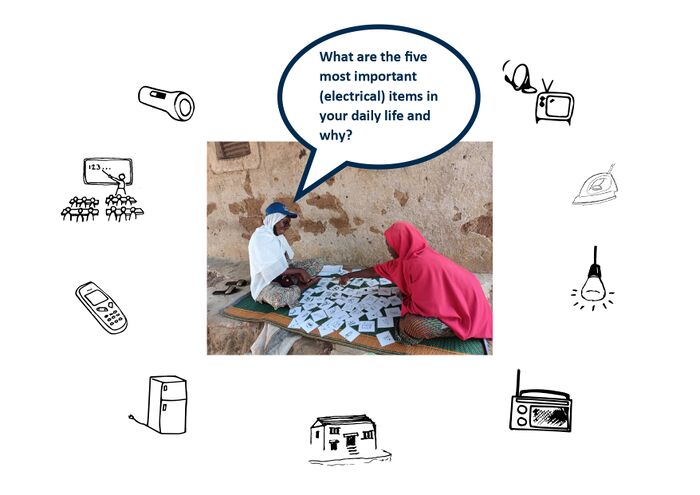Difference between revisions of "PeopleSuN Qualitative Data"
***** (***** | *****) m |
***** (***** | *****) m |
||
| (7 intermediate revisions by 3 users not shown) | |||
| Line 1: | Line 1: | ||
| − | <div class="portal-mozambique"> | + | <div class="portal-mozambique"><!-- Defines the color of headlines, link, etc. ) --> |
| − | {{Backlink Dimension Demand}} | + | {{Backlink Dimension User Needs}} |
| + | {{Backlink Dimension Demand}} | ||
==='''User Perceived Value Game for Energy Needs in Rural and Peri-Urban Nigeria'''=== | ==='''User Perceived Value Game for Energy Needs in Rural and Peri-Urban Nigeria'''=== | ||
| − | + | This qualitative study, conducted in rural and peri-urban regions of Nigeria (North West, North Central, South South), seeks to inform locally relevant electrification projects. By understanding energy needs and motivations, we aim to ensure the long-term success and sustainability of these projects. | |
| − | '''<u>Method</u> | + | '''<u>Method</u>''': We conducted 90 individual interviews using the User Perceived Value Game, complemented by 3599 household surveys. Participants included individual men and women, as well as mixed-gender groups. They were presented with cards displaying everyday electrical items, which they ranked by importance. Through 'why' probing, we introduced an element of storytelling, allowing us to understand the values and needs participants associate with these items. Since the same individuals participated in both individual and group interviews, we could trace changes in item choices across different contexts.<ref>Hirmer, Stephanie und Heather Cruickshank. 2014. „The user-value of rural electrification: An analysis and adoption of existing models and theories.“ Renewable and Sustainable Energy Reviews 34:145–54. doi:10.1016/j.rser.2014.03.005.</ref> |
| − | '''<u>Items</u> | + | '''<u>Items</u>''': The 54 item cards, representing a wide range of everyday products and services found in rural Nigeria, were selected through discussions with local stakeholders and pilot testing. |
| − | '''<u>Data Analysis</u> | + | '''<u>Data Analysis</u>''': Using Natural Language Processing (NLP) techniques, our partner, RuralSenses, identified user-perceived values. We further analyzed essential energy appliances. This analysis will guide the development of rural electrification initiatives tailored to local needs. |
| − | '''<u>Output</u> | + | '''<u>Output</u>''': The results from this qualitative data collection offer insights into the significance of electric appliances, electricity-fueled needs, and associated values. We explore variations and commonalities in preferences across sub-groups, including gender differences. These findings will inform the design and promotion of future energy projects and rural electrification initiatives, ensuring they align with the unique needs and values of rural communities in Nigeria for long-term success and sustainability. |
| − | [[File: | + | [[File:Qualitative data User Perceived Value Game.jpg|700x700px|alt=]] |
| + | |||
| + | The picture displays an individual User Perceived Value Game and some of the item cards that were used in the game. | ||
| + | |||
| + | |||
| + | |||
| + | </div><!-- End .moz --> | ||
[[Category:Nigeria Off-Grid Solar Knowledge Hub]] | [[Category:Nigeria Off-Grid Solar Knowledge Hub]] | ||
Latest revision as of 13:57, 9 October 2023
User Perceived Value Game for Energy Needs in Rural and Peri-Urban Nigeria
This qualitative study, conducted in rural and peri-urban regions of Nigeria (North West, North Central, South South), seeks to inform locally relevant electrification projects. By understanding energy needs and motivations, we aim to ensure the long-term success and sustainability of these projects.
Method: We conducted 90 individual interviews using the User Perceived Value Game, complemented by 3599 household surveys. Participants included individual men and women, as well as mixed-gender groups. They were presented with cards displaying everyday electrical items, which they ranked by importance. Through 'why' probing, we introduced an element of storytelling, allowing us to understand the values and needs participants associate with these items. Since the same individuals participated in both individual and group interviews, we could trace changes in item choices across different contexts.[1]
Items: The 54 item cards, representing a wide range of everyday products and services found in rural Nigeria, were selected through discussions with local stakeholders and pilot testing.
Data Analysis: Using Natural Language Processing (NLP) techniques, our partner, RuralSenses, identified user-perceived values. We further analyzed essential energy appliances. This analysis will guide the development of rural electrification initiatives tailored to local needs.
Output: The results from this qualitative data collection offer insights into the significance of electric appliances, electricity-fueled needs, and associated values. We explore variations and commonalities in preferences across sub-groups, including gender differences. These findings will inform the design and promotion of future energy projects and rural electrification initiatives, ensuring they align with the unique needs and values of rural communities in Nigeria for long-term success and sustainability.
The picture displays an individual User Perceived Value Game and some of the item cards that were used in the game.
- ↑ Hirmer, Stephanie und Heather Cruickshank. 2014. „The user-value of rural electrification: An analysis and adoption of existing models and theories.“ Renewable and Sustainable Energy Reviews 34:145–54. doi:10.1016/j.rser.2014.03.005.




















